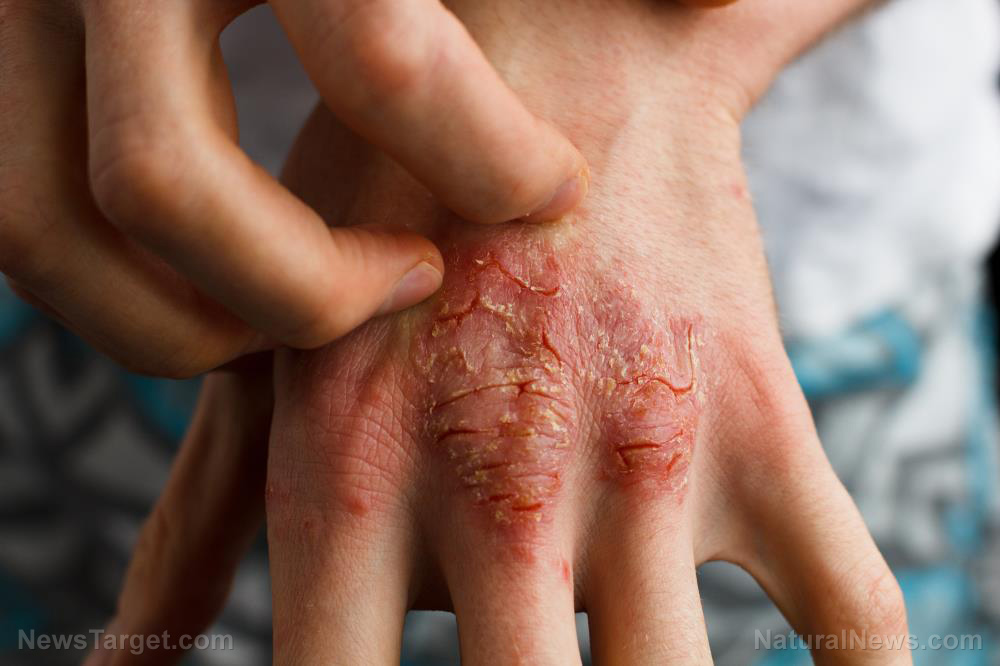Eczema’s hidden burden: How inflammation, diet and mental health intersect in atopic dermatitis
10/27/2025 / By S.D. Wells

Eczema, also known as atopic dermatitis, is one of the most common inflammatory skin conditions, affecting millions of people worldwide. It causes the skin to become dry, itchy, flaky, and inflamed, often resulting in discomfort and visible irritation. While the exact cause remains unknown, researchers believe eczema arises from a combination of genetic, environmental, and immunological factors. Environmental triggers, including diet, have long been suspected to play a role in both the development and severity of this chronic condition.
- Complex causes and dietary role: Eczema, particularly atopic dermatitis, is a chronic inflammatory skin condition influenced by genetic and environmental factors. While diet affects overall skin health, experts like Dr. Peter Lio emphasize that food allergies do not cause eczema—rather, eczema can make the skin more permeable to allergens.
- Anti-inflammatory nutrition: Because eczema is inflammatory, consuming anti-inflammatory foods can help manage symptoms. Nutrients such as vitamin C, vitamin E, omega fatty acids, zinc, and probiotics—found in fruits, vegetables, nuts, fish, olive oil, and fermented foods—support healthy skin and reduce flare-ups.
- Global study links eczema to mental health risks: The 2025 “Scars of Life” study, involving over 30,000 adults across 27 countries, found that 13.2% of adults with atopic eczema reported suicidal thoughts, compared to 8.5% without the condition. This underscores the deep psychological impact of eczema, beyond its visible symptoms.
- Key risk factors for suicidal ideation: Younger adults (under 30), those with obesity, and individuals with moderate-to-severe eczema were most at risk. Factors such as intense itching, pain, stigmatization, and sleep disturbances (particularly mixed insomnia) significantly increased suicidal ideation, highlighting the urgent need for holistic eczema care that addresses both physical and mental health.
The hidden impact of eczema: Inflammation, diet and mental health
The National Eczema Association acknowledges that what we eat can influence our overall health, including skin health. However, modern dermatological research suggests that food allergies do not directly cause eczema. Dr. Peter Lio, a clinical assistant professor of dermatology and pediatrics at Northwestern University, explains that “eczema comes first.” In other words, the condition may precede and even contribute to the development of food allergies, as irritated skin can allow food proteins to penetrate the natural skin barrier, prompting an immune reaction.
Still, the connection between diet and eczema is complex. While no single food or diet can “cure” eczema, certain foods can either exacerbate or help manage inflammation. Dr. Lio emphasizes that if a specific food consistently triggers a flare-up, it should be avoided. More importantly, eczema should be viewed as an inflammatory disorder—meaning that foods that reduce inflammation and support gut health can play a beneficial role in symptom management.
Anti-inflammatory nutrients are abundant in whole, plant-based foods. Fruits and vegetables are rich in vitamin C, antioxidants, and fiber, all of which help reduce oxidative stress and support a healthy gut microbiome. Healthy fats found in foods such as salmon, avocados, olive oil, and nuts provide omega-3 fatty acids and vitamin E, both known to calm inflammation. Zinc, present in seafood, lean meats, and whole grains, also supports skin repair and immune function. Additionally, probiotics in yogurt and fermented foods can help regulate the immune system and strengthen gut-skin communication, potentially improving eczema symptoms over time.
While these dietary strategies may help manage physical symptoms, new research highlights another, often overlooked, aspect of eczema: its profound psychological toll. A 2025 international study titled “Scars of Life” presented at the European Academy of Dermatology and Venereology (EADV) Congress revealed that adults with atopic eczema are significantly more likely to experience suicidal thoughts than those without the condition.
The study, one of the largest of its kind, surveyed 30,801 adults across 27 countries, including over 15,000 participants diagnosed with current atopic eczema. Results showed that 13.2% of those with eczema reported suicidal ideation, compared to just 8.5% in the control group. This elevated risk was observed across all ages of onset—childhood, adolescence, and adulthood—underscoring the pervasive psychological impact of eczema.
Key factors linked to higher rates of suicidal thoughts included young age (especially under 30), obesity, moderate-to-severe eczema, chronic itching, and skin pain. Pruritus (intense itching) and disrupted sleep patterns, particularly mixed insomnia—difficulty both falling and staying asleep—were found to be strongly associated with suicidal ideation. Additionally, feelings of stigmatization and social isolation due to visible skin symptoms intensified emotional distress among sufferers.
Dr. Delphine Kerob, one of the lead authors of the study, noted that the findings demonstrate how “the effects of atopic eczema are more than skin deep.” Beyond the visible lesions and discomfort, patients often endure emotional suffering that can go unrecognized by healthcare professionals. She emphasized that identifying and addressing these mental health risks is crucial for providing comprehensive care.
Looking forward, the research team aims to explore why rates of suicidal ideation differ across countries, suggesting that cultural attitudes toward appearance, mental health, and chronic illness may shape these experiences. Ongoing analyses from the Scars of Life study are also investigating the biological mechanisms linking skin inflammation to mood regulation and psychological well-being.
Together, these findings reinforce a vital message: eczema is not just a superficial skin condition—it affects the whole person. Managing it requires a holistic approach that includes nutrition, stress management, medical treatment, and psychological support. By recognizing both the physical and emotional dimensions of eczema, healthcare providers and patients alike can move toward more compassionate and effective care.
Tune your internet dial to NaturalMedicine.news for more tips on how to use natural remedies for preventative medicine and for healing, instead of succumbing to Big Pharma products that cause, spread, and exacerbate disease and disorder.
Sources for this article include:
Submit a correction >>
Tagged Under:
atopic dermatitis, cures, eczema, gut health, healing, inflammation, mental health, mind, mind body science, remedies, skin care, skin condition, skin health, skin itch, skin rash
This article may contain statements that reflect the opinion of the author
RECENT NEWS & ARTICLES
ImmuneSystem.News is a fact-based public education website published by Immune System News Features, LLC.
All content copyright © 2018 by Immune System News Features, LLC.
Contact Us with Tips or Corrections
All trademarks, registered trademarks and servicemarks mentioned on this site are the property of their respective owners.



















